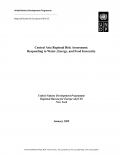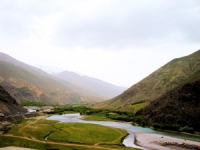Water sharing between Central Asian countries has been conflicting for quite a long time already.
Central Asia Regional Risk Assessment: Responding to Water, Energy, and Food Insecurity
Central Asia’s poorest countries find themselves particularly vulnerable to water, energy, and food insecurities. Tajikistan experienced a “compound crisis” during the winter of 2008, when exceptionally cold weather caused breakdowns in the country’s energy infrastructure, damaged winter crops and reduced livestock herds.
Significant increases in water, energy, and food insecurities resulted. These were subsequently exacerbated by higher global food prices and by the onset of drought conditions in the spring and summer, which particularly affected Central Asia’s southern and eastern regions, as well as parts of the Ferghana Valley and the Aral Sea Delta.
The effects of these problems were magnified by the difficulties the government and humanitarian organisations working in Tajikistan faced in responding to this acute cold-weather emergency, the roots of which were deeply intertwined with Tajikistan’s chronic development challenges.
These concerns increasingly made themselves felt in the Kyrgyz Republic over the course of 2008, particularly in terms of growing energy and food insecurities.





